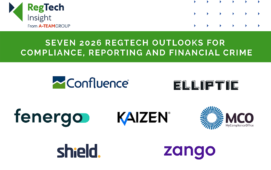
By Alessandro Tonchia, co-founder and director of Finantix.
Delivering innovative Artificial Intelligence (AI)-based technologies to improve business and operational performance is crucial to the future of the wealth management industry.
Wealth management advisors are paid a certain amount of basis points on the proviso that they will give a clear view on what is best for their customers’ financial future. Essentially, it’s a business that is all about human relationships – creating a rich dialogue by tapping into clients’ aspirations understanding their fears and steering them towards the right investment strategy.
To get this dialogue going, wealth management firms need technology that does much more than just compute portfolio performance to the last digit. They need access to a very rich, quantitative and qualitative data model that enables them to understand the client deeply – their personal circumstances, family structure, financial goals, career aims, media footprint etc. But this is still only half the story. Once they have this information, they need substantial, product information to find that perfect match – analyst reports on how a product will develop and access to interviews with portfolio managers.
To be able to have deep dive knowledge of the client and the appropriate products is no mean feat. We are talking about hours of time spent finding and analysing a wide range of information from varied and disparate data sources for each and every client on the books. It’s no surprise then that so many in the industry are looking expectantly towards technology to solve this problem. 42% of respondents in a recent PwC Wealth Management Survey expressed high degrees of optimism around digital technologies usage. It appears that innovation is clearly and quickly moving from a ‘nice to have’ to a ‘must have’ in the wealth management space.
The Pragmatic Path to New Technology Adoption
Having studied analytical philosophy and AI at UCLA, I have been closely monitoring how this field of technology has evolved for the past 30 years. I share the optimism the PwC respondents have about its usage, but retain a healthy dose of scepticism, especially when it comes to some of the more evangelical bandwagons that are passing through town.
With our experience at the coal face of AI for so many years, we have developed a more pragmatic approach by taking the most mature AI disciplines and applying them across the client lifecycle. NLP can play a major role in discovering and profiling information. While machine learning can ensure a tailored approach from the first contact with a client, through to the last. All of this ultimately helps advisors get the deep insight they need without wasting valuable time.
The Legacy Systems Issue: Accelerating the Wheel, Not Reinventing It
A pragmatic approach to implementation is also needed to avoid disruptive incompatibility issues between new innovative technology and trusted legacy systems. Opening up APIs and providing firms with business logic means that they can obtain the maximum benefit of cutting-edge technology without the associated risk and the long time to market required to carry out major projects from scratch.
Of course, it is not uncommon to come across resistance from those in technology departments who push innovation but are reluctant to work with third parties. To some degree, this makes sense. Many firms want the freedom to create technology that reflects their own strategy to keep a competitive advantage. But in a world where technology advances in the blink of an eye, it’s nigh on impossible to keep completely up to date with an in-house only approach.
In these cases, firms are best off working with third parties who are more like partners, accelerating what they are already doing vs. overhauling it completely. With open APIs, building blocks and data structures at their fingertips these firms can achieve their goals faster with less risk. The customer experience is still owned by them, they are still the digital heroes in the firm and it just means more time for the firm to benefit from innovative technology.
It also means that the firm can stay future proof. Another term that is bandied around far too often, but by providing a foundational layer that has an army of experts updating it with the newest operating systems, newest database types, newest search algorithms and newest standards in user interface which is more achievable.
Applying KYC Beyond Compliance and Towards New Business
The KYC process is increasingly costly, repetitive and laborious, especially in the world of private banking where customer service needs to be outstanding. Our AI technology has been employed to enhance the gathering, organisation and analysis of customer information during the KYC processes. But firms are also using our technology to get to know prospective and existing customers in other innovative ways. After all, why should KYC be a practice limited to onboarding?
Integration with core banking systems, policy admin systems, corporate databases (for wealth and shareholding information) and connections to media providers can help advisors understand both the risk in terms of a client’s history and also provide opportunities for obtaining new business.
These connections can reveal a goldmine of information, such as who is selling what company, who is getting promoted, who is relocating and so on. By having a 360° view of prospects and customers that are derived from both internal and external sources containing multiple languages, advisors can scout for opportunities and better configure their offering.
Innovation All the Way Around
Innovative technologies such as AI, NLP and machine learning have the technical capability to streamline KYC process, eliminating delays and client frustration through frictionless on boarding while satisfying regulatory demands. We also deploy them to accommodate the multiple jurisdiction and currency challenges of cross-border business and contribute directly to high-quality customer experience and sustained, high-value relationships.
But innovative technologies alone won’t cut it. Without a pragmatic, tailored approach to building on what they already have in place, most firms will be hard pushed in driving the maximum value out of new technologies while staying ahead of the curve.
Subscribe to our newsletter




